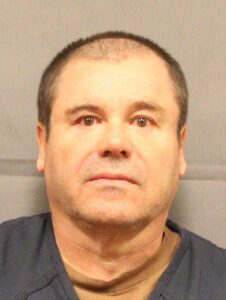When I read this morning that El Chapo’s wife, 34-year old Emma Coronel Aispuro, was just released from federal prison, my immediate reaction was, “Wow! This must mean that the forever war on drugs is finally over. The feds have finally won their drug war and they’re granting amnesty to all the drug-war prisoners of war.”
And then reality hit me. There is no way that the war on drugs can ever be won. So long as the possession or distribution of drugs remains illegal, the drug war will be America’s true forever war on drugs. It can never — and will never — come to an end.
As it turns out, Coronel’s release was simply due to her having served her 3-year jail sentence at the hands of the feds for supposedly having helped her husband, El Chapo, run his multibillion-dollar drug business in Mexico.
The question naturally arises: What good did jailing that woman do? Did her jailing move the U.S. government closer to victory in the forever war on drugs?
For that matter, it’s also worth asking what good has the the jailing of El Chapo done? Has his jailing brought the feds closer to drug-war victory?
Alas, the answer is no. The jailing of El Chapo and his wife have accomplished nothing. The feds are no closer to victory in their forever war on drugs than they were some 45 years ago, when I was practicing law in South Texas and handling drug cases in federal district court.
Back in the 1970s and 1980s, the feds were waging their war on drugs with the same ferocity that the new generation of federal drug warriors wage their drug war today. That included DEA agents, federal prosecutors, and federal judges, who were all doing their very best to “win” their war on drugs. Today, those people are all dead or retired on their generous pensions and replaced by a new generation of agents, prosecutors, and judges who are doing their part to win their forever war on drugs.
Back in the 1970s, there was a federal judge in San Antonio who was known as Maximum John. That’s because he had a standard, simplistic rule: In every drug case, his policy was to mete out the highest allowable drug sentence. He figured that it was his responsibility to help win the war on drugs.
I was practicing law in partnership with my father. We had a client who was about 20 years old who was charged with a one-count heroin conspiracy indictment. He and two of his friends had talked about getting a quantity of heroin and selling it. Mind you, they never actually touched, possessed, or distributed any heroin. They had just agreed to do so. That’s why the indictment charged them only with conspiracy.
After the three of them were convicted, they stood before Maximum John for sentencing. After hearing from each of the lawyers, the judge meted out the sentences: “15, 15, and 15.” He sentenced each of them to the maximum allowable 15 years in jail, despite the fact that none of them had a criminal record.
What good did it do to send those young men to jail for the next 15 years of their lives? No good at all. The forever war on drugs just kept going on and on. Thus, it is that some 40 years later, the feds are still doing the same thing to people like El Chapo and his wife. And as long as drugs remain illegal, they will still be waging their forever war on drugs 40 years from now, albeit with a new generation of drug agents, prosecutors, and judges.
There is only one solution to this mindless drug-war nonsense: the full legalization of all drugs. That would immediately bring an end to all the drug cartels and drug dealers. That’s because they cannot compete against legitimate businesses, like pharmacies. They can compete only in black markets, where violence is the preferred means of competition.
Let me repeat that point for emphasis: There is only one way to put the drug cartels and drug dealers out of business. That one way is drug legalization. Continuing to do what the feds did to my client 40 years ago and what the feds have done to El Chapo and his wife will only guarantee the continuation of this senseless and unproductive drug-war nonsense.
At the same time, drug legalization would save the lives of drug users and drug addicts who are being killed by corrupted drugs. That’s because drug cartels and drug dealers don’t care about who is killed by their corrupted drugs. But pharmacies, who would be selling the drugs, do care about selling a sound product to customers. That’s because they know that they can be sued and will quickly be run out of business if they sell bad products.
Of course, there is another big consequence that would come with drug legalization: Those federal drug-war prosecutors, drug-war judges, DEA agents, and drug-war clerks and administrators would be put out of business too. No more maximum drug-war sentences and no more sending drug dealers and their wives to jail. And no more generous drug-war salaries and pensions and no more drug-war bribes. That’s probably the biggest reason the drug war remains America’s premier forever war. Too many people are benefitting from it.




